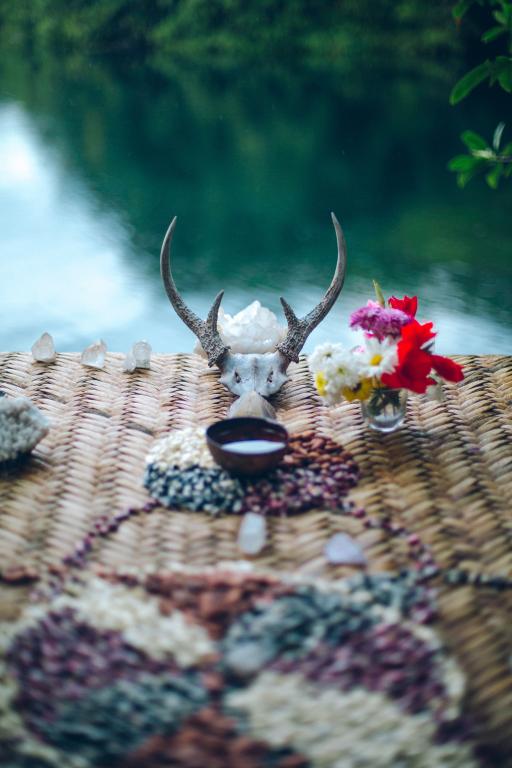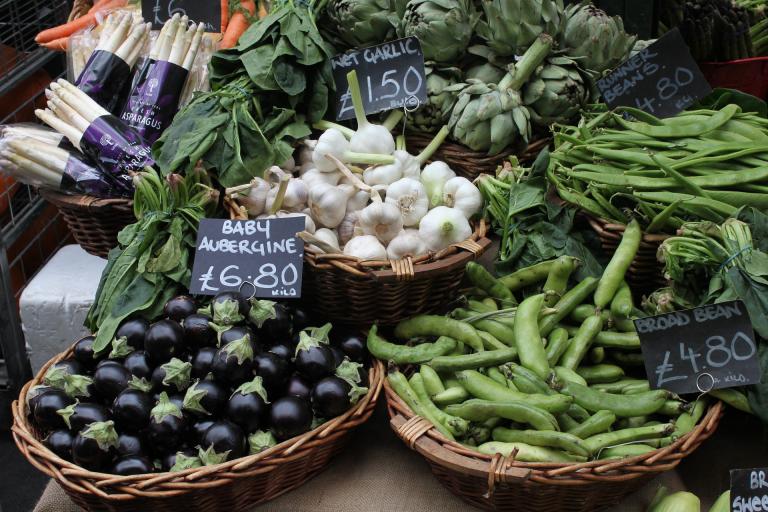I often see questions from new witches about what to offer to their deities, guides, and other spirits they work with. My answer to them is that simple gifts well given will be well received.
If you work with a deity, or deities, currying their favor is no guarantee of living a charmed life, but it can strengthen your relationship and open the channel of communication.
I have been working quite a bit with Hekate in the last year. With a bit of research, I’ve been able to readily find gifts that please Her, including food items such as garlic, leek, saffron, almonds, honey, pomegranate and chocolate.

She also accepts plant offerings of dandelions, roses and the poisons—like foxglove, datura, mandrake, and nightshade, sedatives like poppy, and hallucinogens like wormword, or the milder mugwort. Many minerals, gemstones, blood, bones, and animal remains also please Her.
Bekah Evie Bel shares a comprehensive list of offerings to Hekate, in #10 of her 30 Days of Hekate.
The Slavic Goddess, Mokosh, is a goddess of my ancestry that I would like to know better. She is an Earth Goddess, a protector of women and mothers. My research indicates I might connect with her through offerings of mead, porridge, cottage cheese, and spun wool.
I can make a guess, from the heavy-laden tables of holiday feasts when I was a child, that the porridge might be a form a polenta, the cottage cheese could be mixed with eggs and sugar and laden between layers of a phyllo-like dough, or it might just as easily be buttermilk. And not only the wool of the sheep, but the roasted lamb would likely be appreciated. If not mead, honey and fruit will suffice.
In the case of lesser-known deities and spirits, a little detective work and imagination can bring the answers you seek. Ask yourself what traditional foods were eaten, customs practiced, and regional plants grown in the time and locale of the deity. Also what group of mortals did the deity protect? What activities were associated?

The Goddess Ixchel came to me in an intuitive painting and I have since been learning about her. A Mayan goddess of midwifery and medicine, she is a protector of women and mothers. Her legend tells of her sons that were half Jaguar, and that she herself could shape-shift into a black jaguar to go unseen in the night.
I have not found much in the way of appropriate offerings to Ixchel, but good clues abound in her story. Cultural considerations would point to peppers, spices, cocoa, coffee, and sweet potato and morning glory (both members of the ipomoea plant species).
As a goddess of pharmekia, especially ministering to women and mothers, the sacred herbs and plants used in reproductive health would be appropriate, I’m sure. I could spend hours researching native plants and herbs in Central America, but I personally believe that it’s not necessary. Deities transcend time, location and space. Black cohosh, ginseng, cranberry, rue, maca, red clover and fenugreek will likely be well received, regardless of where they grow naturally.
As for her shape-shifting into a Jaguar, raw meat, animal remains, and blood would serve well as gifts. I also fancy that she may like opals, as her skin was described to have an opalescent quality, rainbow tourmaline, since she associated with rainbows, and any gem or stone related to water.
Animal Offerings
Some cultural spiritual traditions may still call for live sacrifice, but most modern-day pagans do not engage in harming or killing living creatures; there are many humane ways to work around it.
The least offensive way to offer animal energy is through naturally shed fur, feathers, skins, and scales. Save the hair and nail clippings from grooming your pets, look for feathers and skin sheds when you’re walking outdoors.
I save the blood from the meat I eat—there’s always enough to be had when I thaw hamburger or steaks. Setting aside a bit of the raw meat is also an option. Or save the fat and bones to use as your offerings.
If you have to pick up your pet’s feces, you may as well make use of it. That, or wild animal scat, might seem a little disgusting but so are sacrifices of blood and guts—the deities who accept those are probably okay with products of elimination too—accompanying spell-work might be releasing, banishing or warding in nature, as in get rid of that s———!
I can’t leave this subject of animal offerings without mentioning the harvesting of road kill as a source. However, far from being simple witchery, processing a dead animal takes advanced knowledge and skill. Even if all you plan is to throw it to the flames, research the best ways to collect the remains and know all the risks. Protect yourself from possible parasites like lice, and ticks that carry diseases such as lyme and ehrlichiosis. Also, be aware of any restrictions regarding protected animals that could result in fines. Be sure to bless the animal’s spirit on its journey to the next realm.
Using What’s Practical and Available
For witches living in rural areas, or suburban neighborhoods with green space, the wide outdoors is your supermarket. Just be sure to forage and harvest responsibly, asking for permission when not on your own land, never taking more than you need or over-harvesting to the point of endangering the plant’s survival. Always leave something in exchange.
I like to leave birdseed where appropriate, but you don’t always have to leave something. Whenever I walk through the county forest park near my home, I bring a bag along to pick up trash in respect of Earth Spirit, and as an exchange of energy.

If you tend your own gardens, weeding, watering and fertilizing with organic matter is a fair exchange. And of course, don’t forget prayers to ask permission, and as thanks, for what is given.
For Urban witches surrounded by pavement and high rises, the supermarket is your hunting ground. Stalk the spice, produce, meat and dairy isles. Don’t forget eggs, coffee, cocoa and chocolate, honey, maple syrup, and nuts and seeds, like almond, sunflower and flax—as oils too, along with olive, grape seed, sesame, coconut and corn oils. Tomatoes, potatoes and bell peppers are nightshades, corn is sacred to many cultures, and grains like wheat and rye, can be had in crackers and cereals.
The Act of Offering
If you take away only one thing from reading this, please remember that offerings do not have to be given in large amounts. A tiny bit is enough and doesn’t abuse resources, nor leave behind unnecessary refuse once the energy has been transformed and accepted.
Be sure to research the particular deities you wish to appeal to. For example, food offerings to Hekate are best left at a three-way crossroad, on a dark moon night.

If you can’t find any guiding information, use what you know about the deity, and the offering. Also, try asking for guidance from the God, Goddess, or Spirit you are appealing to.
To again use Hekate as an example, I might feed an offering of meat to your dog (honoring her hounds). Or for Ixchel, associated with water, I might brew some strong coffee in spring water and then pour onto the ground.
Burning, burying, or flushing are all ways to transform offerings into a form that deities and spirits can receive.
These are the preferred methods if you offer food, plants, bones, or anything that might be harmful if consumed by animals or humans.
If disposing outdoors is not possible, consider flushing (remember, small amounts and don’t flush anything that might clog plumbing). Don’t flush pharmaceuticals, poisoners’ plants, or harmful chemicals that will find their way into the ground water.
If there is a specific call to bury an offering, houseplants work for urban witches, as well as those of us who live on frozen ground in winter months. For gardeners, consider composting your suitable offerings.
If working with elemental spirits, align your method with the element, bury offerings to Earth, let the wind carry away offerings to Air, burn offerings to Fire, and dissolve offerings to Water.
Of course, be mindful of these methods, don’t bury toxins that harm the earth. Don’t pollute air or waterways, and don’t introduce anything that will cause algae bloom in waterways or otherwise disrupt the ecosystem.
Refrain from littering by tossing offerings to the air. Instead, your Air offerings are probably best left to smoke, steam, scent, or sound. Yes—speaking, chanting, singing, laughing, clapping, drumming (or playing any instrument) can be an offering!
Always practice safe burning in covered containers, and don’t burn outdoors during times of high fire danger. Don’t burn anything that releases toxins to the air, or the earth when ashes are reclaimed.
Remember that it’s not what you offer, how much you offer, or which method you use to offer it mindfully and safely, but rather the intent behind the gift. A small pinch of herbs carries your intent just as efficiently as a handful. Offer the best you have to give, with heartfelt devotion or sincere plea, and it will be received.
The Simplest Offering
There are two ways I like to offer gifts that I believe are often overlooked, and which alleviate many of the concerns of what might be left behind.
The first is really a no-brainer—acts of service. Donate to food shelves and charity organizations, volunteer at a food bank distribution, or give your time and skills to a worthy, non-profit organization. These can all be done as offerings to your chosen deities, spirits and guides.
“Ask Hecate whether it is better to be rich or starving; she will tell you that the rich send her a meal every month and that the poor make it disappear before it is even served.” ~ In Plutus by Aristophenes
The second method of simple offering was revealed to me during ritual. I’d lit a fire in the ring at my outdoor shrine, cast my circle, and sat down for an informal chat with whoever might join me in spirit. I’d placed some standard offerings on the altar stone—wine, cakes (probably cookies of some sort), chocolate and a few almonds. I’d brought a cup of rich, dark coffee for myself.
I was soon engaged in conversation with Hekate. I paused to take a sip of my coffee and I heard (I don’t actually hear with my ears, I’m claircognizant so the thoughts or words come fully formed into my head), “I’d like some of that.”
I was a bit taken aback, but I thought, why not? I took a mindful sip of the coffee, appreciating the flavor, the temperature, the feel of it on my tongue and the warming sensation down my throat as I swallowed.
“So good,” she said. “And the chocolate?”
I took a bite of the dark chocolate nugget, feeling the texture on my tongue, savoring the balance of bitter and sweet.

Why hadn’t I thought of it before? Why wouldn’t the deities and spirits want to experience through our mortal senses, that which they have no body, no physical means, to enjoy?
However you choose to make offerings, find a simple but meaningful method that works for you, do it with heartfelt intent, and rest assured that it will be received.














